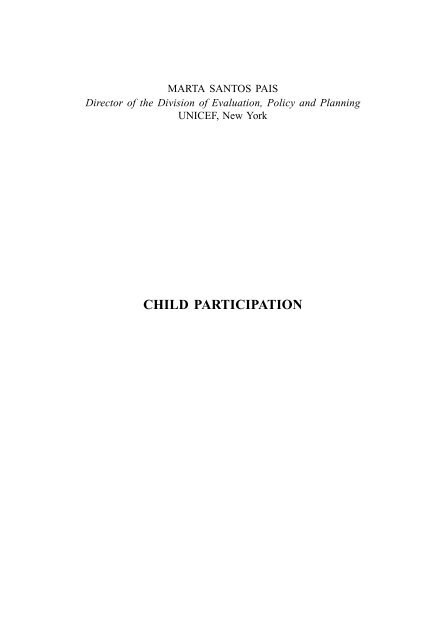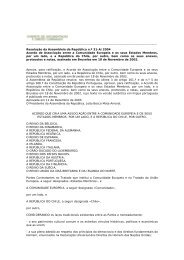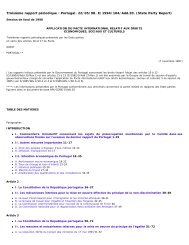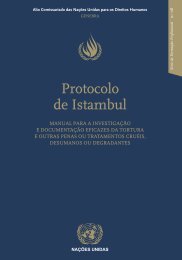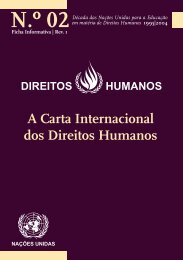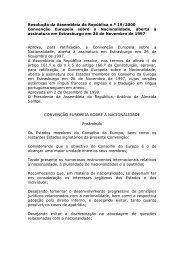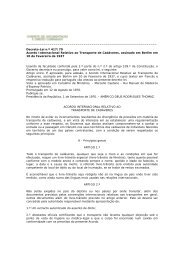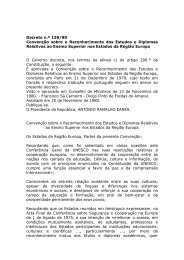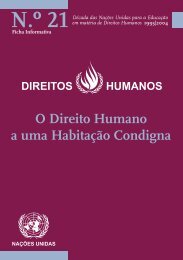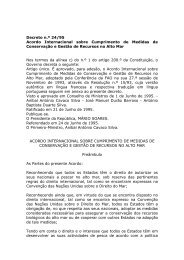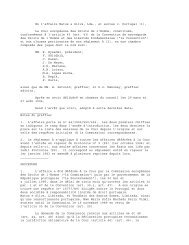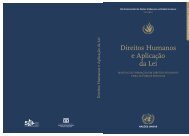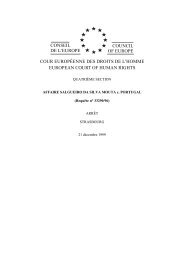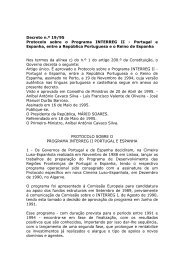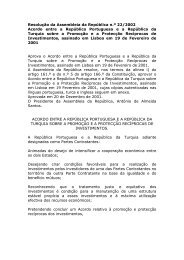child participation - Gabinete de Documentação e Direito Comparado
child participation - Gabinete de Documentação e Direito Comparado
child participation - Gabinete de Documentação e Direito Comparado
You also want an ePaper? Increase the reach of your titles
YUMPU automatically turns print PDFs into web optimized ePapers that Google loves.
MARTA SANTOS PAISDirector of the Division of Evaluation, Policy and PlanningUNICEF, New YorkCHILD PARTICIPATION
Documentação e <strong>Direito</strong> <strong>Comparado</strong>, n. os 81/82 20001. The Convention on the Rights of the Child is a landmark in the historyof the United Nations standard-setting. It entered into force in a very shortperiod of time, just 9 months, and has reached an unprece<strong>de</strong>nted numberof ratifications – 191, that is all countries but two (US and Somalia).The Convention also stands as a unique achievement – being the firstlegal instrument adopted after the cold war and bridging two political blocs,bridging North and South, bridging civil and political rights, as well as economic,social and cultural rights, associating State responsibility with the activeinvolvement of civil society.More important than that, the Convention has provi<strong>de</strong>d a new visionof <strong>child</strong>ren. While acknowledging that the <strong>child</strong> is a vulnerable human beingthat requires the protection and assistance from the family, the society and theState, the <strong>child</strong> is envisaged as a subject of rights, who is able to form an<strong>de</strong>xpress opinions, to participate in <strong>de</strong>cision-making processes and influencesolutions, to intervene as a partner in the process of social change and in thebuilding up of <strong>de</strong>mocracy.With the Convention, <strong>child</strong>ren can no longer be perceived as not-yetpersons, waiting in the lobby of life to become mature by the magic effect ofreaching the age of maturity. They are not simply the passive recipients ofcare or of adult’s <strong>de</strong>cisions. If we address <strong>child</strong>’s health, their ability to haveaccess to information becomes essential; if we address education, their evolvingcapacity in gaining skills, experience and responsibility, becomes critical; if weconsi<strong>de</strong>r the situation of the <strong>child</strong> within the family, their active contribution to<strong>de</strong>cisions that may affect their lives is essential – be it the case of adoption,custody or place of resi<strong>de</strong>nce when the parents are separated. With theConvention, solutions need to be built with <strong>child</strong>ren, consi<strong>de</strong>ring theirperspective on the realities we want to address and ensuring that they areempowered to make informed choices and enrich results.93
With the Convention, the relationships between adults and <strong>child</strong>renalso change. Parents, teachers, care givers and others interacting with <strong>child</strong>renevolve from mere provi<strong>de</strong>rs, protectors or advocates to negotiators andfacilitators. They are expected to create spaces and promote processes <strong>de</strong>signedto enable and empower <strong>child</strong>ren to express views, to be consulted, to influence<strong>de</strong>cisions.Several provisions in the Convention reflect this innovative approach, butone in particular reveals this special dimension – article 12. This article setsone of the fundamental values of the Convention, as well as one of its basicchallenges. In essence, it affirms that the <strong>child</strong> is a fully-fledged person havingthe right to express views in all matters affecting him or her, and requiring thatthose views are heard and given due weight. It recognises the potential of the<strong>child</strong> to enrich <strong>de</strong>cision-making processes, to share perspectives and participateas a citizen and an actor of change.In the light of this provision, the <strong>child</strong> has the right to participate in <strong>de</strong>cisionmakingprocesses that may be relevant for their lives and to influence <strong>de</strong>cisionstaken in their regard – within the family, the school or the community. It is forthis reason that article 12 is often i<strong>de</strong>ntified as portraying the right of the <strong>child</strong> to<strong>participation</strong>.Article 12 is a visionary provision, but it has also a very practicalmeaning which needs to be consi<strong>de</strong>red in each and every matter relevant tothe <strong>child</strong>. It indicates the way the process of the realisation of the rights of the<strong>child</strong> needs to be promoted – with <strong>child</strong>ren. And it further shows that as afundamental right of the <strong>child</strong>, it stands on its own, requiring a clearcommitment and effective actions to become a living reality, and being muchmore than a simple strategy.It was for this reason that the Committee on the Rights of the Childi<strong>de</strong>ntified article 12 as one of the fundamental principles of the Convention,– an un<strong>de</strong>rlying value which needs to gui<strong>de</strong> the way each individual right isensured and respected; a criteria to assess progress in the implementationprocess of <strong>child</strong>ren’s rights; and an additional dimension to the universallyrecognised freedom of expression, implying the right of the <strong>child</strong> to be heardand to have his or her views taken into account.2. At a first sight, article 12 may be perceived as a simple reaffirmationof the right to freedom of expression. And they are closely related. Butarticle 12 stands for much more than just the recognition of the right to seek,impart and receive information and i<strong>de</strong>as of all kinds. In fact it highlights theright of the <strong>child</strong> to express views freely, and further to have those views94
Documentação e <strong>Direito</strong> <strong>Comparado</strong>, n. os 81/82 2000taken into consi<strong>de</strong>ration in all matters which may be of relevance to the<strong>child</strong>. It applies to the family setting, the school context or the community leveland it inclu<strong>de</strong>s the right to be heard in administrative and judicial proceedingsaffecting the <strong>child</strong> (for instance the place of resi<strong>de</strong>nt in case of separation ofparents or a <strong>de</strong>cision on the adoption of the <strong>child</strong>).But what does this mean? Respecting the views of the <strong>child</strong> means thatthey should not be ignored; but it also means that <strong>child</strong>’s opinions shouldnot be simply endorsed. Expressing an opinion is not taking a <strong>de</strong>cision. But itimplies the ability to influence <strong>de</strong>cisions. Thus, a process of dialogue an<strong>de</strong>xchange needs to be encouraged to prepare the <strong>child</strong> to assume increasingresponsibilities and to become active, tolerant and <strong>de</strong>mocratic – combining adultsdirection and guidance to the <strong>child</strong> with the consi<strong>de</strong>ration of the <strong>child</strong>’s views ina manner that is consistent with the age and maturity of the <strong>child</strong>; giving the<strong>child</strong> an opportunity and ability to un<strong>de</strong>rstand why a particular option and notanother is followed, why a particular <strong>de</strong>cision is taken and not the one the<strong>child</strong> might have preferred.3. It is important to note that <strong>child</strong>’s <strong>participation</strong> is a right, and shouldnot be perceived as a duty. It implies for the <strong>child</strong> the freedom of expressingviews or preferring not to do so. It means the opportunity to take a stand but notto be forced to do so.The <strong>child</strong> should therefore not suffer any pressure, constraint or influencethat might prevent a free expression of opinions or lead to the manipulationof his or her feelings. This certainly applies to legal solutions accordingto which a <strong>child</strong> is forced to participate as a witness in a judicial proceeding,even if it is clear that such a solution is contrary to his or her best interests. Inthis regard, it is interest to note that in many countries while <strong>child</strong>ren are expectedto join a judicial proceeding as witnesses, often without any minimum age limit,they are rarely entitled to directly launch a complaint as a victim – including inthe case of ill-treatment or sexual abuse. The law often foresees the possibilityfor parents or care-givers to do it on behalf of the <strong>child</strong> – which of course doesnot address the situation of a <strong>child</strong> victim within his or her own family.4. The Convention does not set any lower age limit on <strong>child</strong>ren’s rightto express views freely, nor upon where those views may be expressed. TheConvention acknowledges that <strong>child</strong>ren can and do form views from avery early age. References in the Convention to the “evolving capacities” ofthe <strong>child</strong> emphasise the <strong>child</strong>’s <strong>de</strong>veloping capacity for <strong>de</strong>cision making. Thismeans, for example, that parents and, where appropriate, members of the family95
and wi<strong>de</strong>r community are expected to give appropriate direction, guidance oradvice. But, as the <strong>child</strong> grows and evolves, gains maturity and experience,direction will lead to an increasing <strong>de</strong>gree of autonomy and responsibility of the<strong>child</strong>, and guidance and advice gain greater value and meaning. In an evolvingway and in manner consistent with the age and maturity of the <strong>child</strong>, therewill be various ways of creating the right atmosphere to enable the freeexpression of the views by the <strong>child</strong> – even at a very young age, the <strong>child</strong>interacts with adults and cries or smiles to express feelings, wishes, fears an<strong>de</strong>xpectations.For those close to <strong>child</strong>ren, particularly members of their family, it isimportant to be available to listen and un<strong>de</strong>rstand <strong>child</strong>ren, to give themthe time and space for them to feel confi<strong>de</strong>nt and encouraged to expresstheir opinions.And there will be different ways of promoting and ensuring <strong>participation</strong>in view of the <strong>child</strong>’s age and, within each age group, in the light of the individual<strong>child</strong>’s ability, confi<strong>de</strong>nce and experience in assessing its own situation,consi<strong>de</strong>ring possible options, expressing views thereon and influencing <strong>de</strong>cisionmakingprocesses. Amongst <strong>child</strong>ren, it is important that the ol<strong>de</strong>r and moreadvantaged foster the <strong>participation</strong> of the younger and most disadvantaged,including girls, the poorest, <strong>child</strong>ren belonging to minority groups and indigenousgroups, or migrant <strong>child</strong>ren.But, the <strong>child</strong>’s evolving capacity represents just one si<strong>de</strong> of theequation: the other has to do with adults’ evolving capacity and willingnessto listen to, un<strong>de</strong>rstand, and weigh the views expressed by the <strong>child</strong>. Theimplementation of this right therefore calls for the training and mobilisation ofthose who live and work with <strong>child</strong>ren, preparing them to give <strong>child</strong>ren thechance of freely and increasingly participating in society and of gaining<strong>de</strong>mocratic skills. This inclu<strong>de</strong>s, most obviously, parents and other familymembers, but also relates to society at large, to groups such as teachers, socialworkers, lawyers, psychologists, and the police.5. Article 12 is far from being the only provision addressing <strong>child</strong>ren’sparticipatory rights. As mentioned already, it is closely linked to freedom ofexpression. It is also related to the fulfilment of the right to information, whichis a key prerequisite for the <strong>participation</strong> of the <strong>child</strong> to be relevant andmeaningful. It is in fact essential that the <strong>child</strong> be provi<strong>de</strong>d with the necessaryinformation about the possible existing options and the consequences arisingtherefrom, so that an informed <strong>de</strong>cision, and a free <strong>de</strong>cision, be ma<strong>de</strong>. Providingthe <strong>child</strong> with information means enabling him or her to gain skills, confi<strong>de</strong>nceand maturity in expressing views and influencing <strong>de</strong>cisions.96
Documentação e <strong>Direito</strong> <strong>Comparado</strong>, n. os 81/82 2000Moreover, article 15 guarantees the right to create or join associations,and to peaceful assembly. Both imply the opportunity to express political opinionsor engage in political processes, to participate in <strong>de</strong>cision-making processesand both are critical to the <strong>de</strong>velopment of a <strong>de</strong>mocratic society, and to therealisation of <strong>child</strong>ren’s rights ensured with the <strong>participation</strong> of <strong>child</strong>renthemselves.But the right to <strong>participation</strong> is relevant to the exercise of all other rights,within the family, the school or the larger community context.Thus, for example:— In the case of adoption, the <strong>child</strong>, as one of “the personsconcerned”, is to be heard in any judicial or administrative proceedings,and in fact Article 21 (a) refers to the informed consent of personsconcerned, including the <strong>child</strong>;— If a <strong>de</strong>cision is to be taken on the need to separate the <strong>child</strong> from hisor her parents, on the basis for instance, of abuse or neglect, the<strong>child</strong>, as one “interested party”, must be given an opportunity toparticipate and make his or her views known;— If a <strong>de</strong>cision is to be taken on the change of the name of the <strong>child</strong>, theviews of the <strong>child</strong> should be taken into consi<strong>de</strong>ration;— To ensure the enjoyment of the right to health, <strong>child</strong>ren are entitled tobe informed, have access to information and be supported in the use ofbasic knowledge of <strong>child</strong> health and nutrition… (article 24 para. 2 e)).— Similarly, in the area of education, the <strong>participation</strong> of the <strong>child</strong> gainsa special dimension. In fact, it means a process of learning whichprovi<strong>de</strong>s an opportunity for the <strong>child</strong> to <strong>de</strong>velop his or her talents andabilities to their full potential, to gain confi<strong>de</strong>nce and self-esteem, topromote initiative and creativity, to gain life-skills and make informed<strong>de</strong>cisions, to un<strong>de</strong>rstand and experience pluralism, tolerance and<strong>de</strong>mocratic coexistence. In brief, the right to education means theright to experience citizenship.And all this can only happen if <strong>child</strong>ren are perceived not as recipient ofknowledge, but rather as active players in the learning process. It is forthis reason that the Convention puts so much emphasis on the aims of educationand on a system that respects the human dignity of the <strong>child</strong>. And a fewconsequences arise therefrom:a) First, it implies the need to support learning by doing and experiencing,avoiding simple repetition and memorisation.97
) Second, it reflects the recognition of the right of the <strong>child</strong> to divergein his or her views; to test, error and retry, to know and not knowwithout fearing penalisation or sense of failure.c) Third, it requires the need to establish a violence free environment,where the dignity of the <strong>child</strong> is respected, inhuman discipline or corporalpunishment forbid<strong>de</strong>n and where negotiation and dialogue prevailas a means of preventing and solving conflicts.d) Fourth, it indicates that <strong>child</strong>ren should be given opportunitiesfor active <strong>participation</strong>, <strong>de</strong>cision making and responsibility withinthe school in or<strong>de</strong>r to prepare them for life in a free <strong>de</strong>mocratic society.In this regard, it is important to note the trend to ensure stu<strong>de</strong>nts’representation in school councils and disciplinary boards, theconsi<strong>de</strong>ration of their views when the curriculum is being revised, theschedule in school is being <strong>de</strong>ci<strong>de</strong>d or recreation activities are beingpromoted. It is equally relevant to ensure stu<strong>de</strong>nts’ <strong>participation</strong> inproceedings specifically relevant to them – in particular, when a <strong>de</strong>cisionon suspension or expulsion may be at stake.The school plays a <strong>de</strong>cisive role in this process when it provi<strong>de</strong>s the<strong>de</strong>mocratic setting for views to be expressed openly and discussed, for fairnessand justice to be ensured, for <strong>participation</strong> to be encouraged and experienced.We assist to a visible trend to ensure the <strong>participation</strong> of <strong>child</strong>ren in schools.In France, for instance, elected stu<strong>de</strong>nts sit at National Board of Educationand take part in major discussions on the educational system. In Chile, stu<strong>de</strong>ntscentres are being established as a channel through which the concerns andneeds of young people can be expressed and shared, and as a forum to promotethe <strong>de</strong>velopment of members’ ability of reflection and critical judgement andtheir willingness to take action and become prepared for a <strong>de</strong>mocratic life andfor <strong>participation</strong> in cultural and social change. In Namibia, the Co<strong>de</strong> of Conductfor Schools recognises the right of stu<strong>de</strong>nts to have their opinions taken intoconsi<strong>de</strong>ration in setting school policy regarding discipline, and provi<strong>de</strong>s grievanceand appeal procedures. In Bulgaria, <strong>child</strong>ren over 14 are entitled to expresstheir preference in the choice of school and type of education, as well as to putproposals forward regarding the organisation and conduct of its activities. InColombia, <strong>child</strong>ren also participate in the planning of their school activities and<strong>child</strong>ren’s councils are established as part of education for citizenship, and infact as a means of reverse in the marginalisation of <strong>child</strong>ren living in rural areasor belonging to indigenous groups.98
Documentação e <strong>Direito</strong> <strong>Comparado</strong>, n. os 81/82 20006. Participation is an entitlement, and cannot be genuine if it gives noopportunity for the <strong>child</strong> to un<strong>de</strong>rstand the consequences and the impact ofhis or her opinions. ‘Participation’ should therefore not be used to disguisefor any form of manipulation or tokenism. Again, the issue is, as the Conventionas stressed, how to express respect for the views of the <strong>child</strong>.It is for this reason that, in addition to facilitate and support activities where<strong>child</strong>ren can freely participate, it is becoming increasingly important to consi<strong>de</strong>rwhether and how we are prepared to ensure a follow-up to <strong>child</strong>ren’s recommendationsor expression of concern.With the expression of the <strong>child</strong>’s views comes the responsibility for adultsto listen and learn from them, to un<strong>de</strong>rstand and consi<strong>de</strong>r the <strong>child</strong>’s point ofview and re-examine adults’ own opinions and attitu<strong>de</strong>s, be willing to changethem and to envisage solutions which address <strong>child</strong>ren’s i<strong>de</strong>as. For adults, aswell as for <strong>child</strong>ren, <strong>participation</strong> is a challenging learning process and cannotbe reduced to a simple formality.7. This also applies to UNICEF. Committed to support the implementationof the CRC and ensure the realisation of the right to <strong>participation</strong>, theOrganisation is going through an important <strong>de</strong>bate on the requirements for agenuine <strong>participation</strong> of <strong>child</strong>ren, its potential and impact, including on the waywe work – not less in the assessment of the reality in countries, the <strong>de</strong>velopmentof programmes of cooperation, monitoring and evaluation.One trend we note is the support to the realisation of <strong>child</strong>ren’s elections,which provi<strong>de</strong> an important learning <strong>de</strong>mocratic experience. This was clearlythe case when elections on <strong>child</strong>ren’s rights were organised in Mozambique,even before any political experience of that kind had ever occurred in the country.Through <strong>child</strong>ren, adults became familiar with the registration process, theawareness and information campaigns, the i<strong>de</strong>ntification requirements and theprevention of fraud, the secret ballot, the public announcement of results andthe welcoming of the most wi<strong>de</strong>ly voted right of the <strong>child</strong> – the right to ani<strong>de</strong>ntity. And the meaning of such a choice was certainly un<strong>de</strong>niable for a country<strong>de</strong>vastated by war. It gave a strong sense of citizenship and hope in theconsolidation of peace. This experience galvanised the country, and later led toa national campaign for birth registration. Children became visible and clearlyassociated with the <strong>de</strong>mocratic process in the country.In Ecuador, the <strong>child</strong>ren’s election was organised at the same time as thenational election for Congress. This constituted an important reason to mobiliseattention and to lead to comparison between the adults’ and <strong>child</strong>ren’s process.But more interesting was even the result of the vote – in the view of <strong>child</strong>ren,99
the most relevant right was the right to be protected against abuse and illtreatment,a hid<strong>de</strong>n phenomenon but certainly important enough to becomecritical in their eyes. Unfortunately no visible follow up was given to themessage conveyed by the <strong>child</strong>ren and their expression of concern remainedsimply an expression of concern…In Mexico, the election was organised with the In<strong>de</strong>pen<strong>de</strong>nt Fe<strong>de</strong>ralElectoral Institute, which had for a few years organised programmes on civiceducation for school age <strong>child</strong>ren, to promote the values of pluralism, dialogueand tolerance. Similarly to what had happened in Ecuador, the elections wereorganised the same day of the Fe<strong>de</strong>ral elections, although using <strong>child</strong>-friendlyplaces, including schools and parks for <strong>child</strong>ren’s ballots. The results indicatedthe need for a priority attention to the area of education. Differently from Ecuador,in Mexico there was an attempt to consi<strong>de</strong>r the message from the <strong>child</strong>ren andto envisage an effective follow-up. In a Pact around <strong>child</strong>ren, all the politicalparties agreed to envisage a plan to address the absenteeism of teachers, topromote the reform of the school curricula and to ensure relevance to theeducation system. It is still too soon to anticipate results, but hopefully theprocess will generate change and <strong>child</strong>ren will be involved in its <strong>de</strong>velopmentand implementation.In Chile, Unicef promoted an interesting experience – an opinion poll for<strong>child</strong>ren to evaluate the relevance of the existing education system. Similarly toMexico, their assessment indicated a clear need for change and reform.These are but a few examples of a world-wi<strong>de</strong> movement to increase thespaces and opportunities for <strong>child</strong> <strong>participation</strong>. And while each experiencebrings valuable lessons, we must build into our efforts strong monitoring an<strong>de</strong>valuation components where we constantly test our initiatives against theprinciples of the Convention – is what we are proposing, or doing, in the bestinterests of the <strong>child</strong>?; are we acting without discrimination of any form?; havewe ma<strong>de</strong> spaces, given voice and listened to the most disadvantaged andmarginalised?; how do we work genuinely with <strong>child</strong>ren and curb adult ten<strong>de</strong>nciesto control and manipulate outcomes or at least to pretend that <strong>child</strong>ren are ableto make a difference in <strong>de</strong>cision-making processes?Conclusion:In the vision that I have outlined today the <strong>participation</strong> of <strong>child</strong>ren isa right in itself and essential to consi<strong>de</strong>ration of what is in the best interestsof the <strong>child</strong>.100


